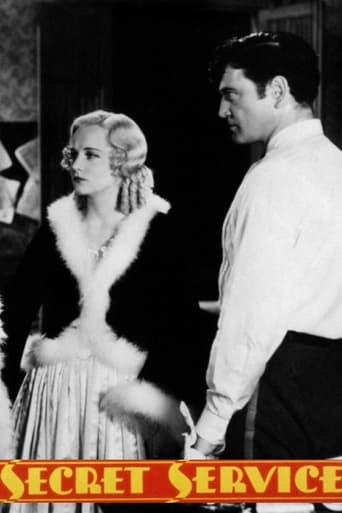Ron Oliver
Two brothers, both members of the Union's SECRET SERVICE, make their way behind Confederate lines to assist in the capture of Richmond.Based on a play by the celebrated American stage actor William Gillette, this nearly forgotten Civil War film offers an interesting espionage plot and three actors worth watching.Sturdy leading man Richard Dix provides a fine performance as a conflicted hero who would probably have gotten shot by both sides if captured. Even when the dialogue given him was substandard, Dix could always be counted on to instill some life into his character.Gavin Gordon plays the Virginia official, consumed with jealousy, who engages Dix in a deadly war of wits. Wonderful Clarence Muse brings real heart to his portrayal of a friendly slave whose good nature gets him into terrible trouble.The film has definite drawbacks. The romance Dix has with a Southern belle (Shirley Grey) is neither convincing nor compelling. The spy plot, dealing greatly with multiple coded telegraph messages, is rather difficult to follow. And the film fairly cries out for a background score to push the action along (Max Steiner, later one of the big names in cinematic music, provides the scant score).
Silents Fan
This creaky old espionage flick is based on a play by William Gillette, who also wrote the popular Sherlock Holmes play. Richard Dix is suitably stoic in the lead role as the Union spy masquerading as a Confederate artillery officer from Texas. The movie is surprisingly gritty for the time. An innocent black man is hanged for spying and Dix's character's brother shoots himself to maintain Dix's cover. The racial stereotypes are broad and offensive, and the phony southern accents are thick enough to cut with a knife. Gavin Gordon, as the ruthless confederate spymaster, steals the show. William Gillette isn't Ian Fleming and Richard Dix isn't Sean Connery. This movie would be of interest primarily to those interested in William Gillette or to the fans of Richard Dix.
frankfob
This Civil War spy drama is based on a stage play, and it shows. Director J. Walter Ruben eventually turned into a competent filmmaker, but at this early stage of his career he was apparently enamored of the "bolt the camera to the floor and never move it" school of directing, as this is an extremely static and stagy film. It gets a bit more mobile during the few outdoor shots, but the interior scenes must be why the term "photographed stage play" was invented: people stand around in one position, seldom move and recite their dialogue pretty much by rote. Leading man Richard Dix tries to inject some life into the dull proceedings, but the insipid dialogue, wooden supporting performances and leaden direction doom his efforts to failure.
max von meyerling
Important only as a record of a real turn of the century barnstormer, a theatrical chestnut concocted by William Gillette, the man who brought Sherlock Holmes to the stage. A compact civil war drama that can be played in front of a bare minimum of sets, its story twists and turns in on itself basically getting down to the dilemma of a Union spy-duty or love. Though he is exposed nearly from the beginning the story oscillates between a will he or won't he conundrum which fills out the running time. Two gruesome deaths seem to effect the main protagonists not at all. Still an authentic glimpse of what the American public considered fine entertainment and serious theatre from a different time. As hokey as the tale seems today it was reprised in 1977 by PBS as a vehicle for Meryl Streep and John Lithgow ?!!. As far as the Civil war goes it has not a shred of authenticity in its bones. Best performance is by Florence Lake, in blackface, as a slave.Previously filmed by Famous Player Lasky in 1919, this hammy play was revived no doubt because it was something from new RKO studio head David Selzick's childhood.


